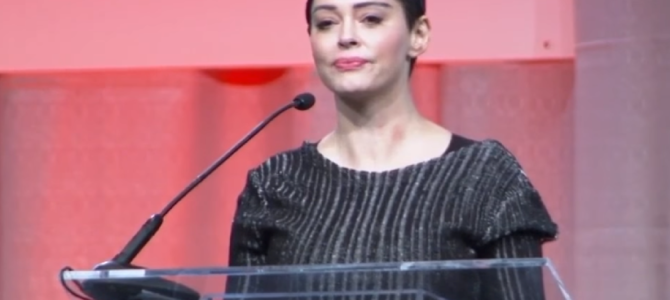
Until her suicide last week, most people had never heard of Jill Messick, which by all accounts, was how she wanted things. She wasn’t a star, but she babysat for them, as all film producers must, and she knew first-hand how ugly fame can be.
Messick was Rose McGowan’s manager at the time of her now-infamous 1997 meeting with Harvey Weinstein, which ended in a hot tub. Although at the time of the incident, McGowan seems to have felt comforted by Messick’s response (“She held me,” McGowan told The New York Times. “She put her arms around me,”), over time, McGowan came to see Messick as complicit.
In her new book, Brave, and on Twitter, where McGowan has raised an “army” of nearly one-million followers, she has lashed out at Messick for arranging the meeting with Weinstein, for failing to support her, and for pressuring her to settle with him. For taking a job ten months after the incident at Weinstein’s company, as Messick did. For being part of the problem.
Messick had her own version of events, but she kept those to herself. According to a statement from her family, Messick believed in the #MeToo movement and supported its goals, and she hadn’t wanted to undermine it by contradicting her former client. She was also battling depression and bipolar disorder.
On January 31, Weinstein’s defense attorney, Ben Brafman, released an email from Messick solicited by Weinstein before The New York Times broke the scandal. In the email, Messick said that in 1997, McGowan had admitted to her that “getting into that hot tub was something that she did consensually and that it hindsight it was also something that she regretted having done.” But McGowan had never called the incident “rape.” Ben Affleck, with whom McGowan also discussed the encounter soon after it occurred, confirmed the same.
“Fuck you you fucking douche bag loser from hell,” roared McGowan on Twitter at Weinstein, in response to the release of these emails. Under an avatar image of herself with a raised fist, McGowan regularly whips her “#RoseArmy” into a frenzy.
“You will burn,” she tweeted. “You will be an empty suit coffin. You go fall off the planet you fuck.” And then, in what might be construed as a direct command her Twitter “army”: “#RoseArmy BREATHE FIRE let motherfucker but”
Did she mean “burn?” Notwithstanding typos, the troops seem to have caught the gist.
Members of the “RoseArmy,” intent on finding Messick, coordinated, in search of the right internet doors to bang on. Messick had tried to disguise her social media presence in an attempt to preserve some privacy, but she maintained a LinkedIn account, as a half-billion working people do. They found her there. They hounded her. They spewed ugly taunts and demanded on Twitter that she “give back [her] woman card.”
It didn’t matter that at the time of the 1997 incident, newly-minted talent manager Jill Messick had gone straight to her partners to report it and insisted they rectify the situation, according to the statement by her family. Or that Messick was assured by the partners that they would handle the situation, and that it was now out of her hands. None of the trolls knew, or maybe none of them cared.
“Jill was victimized by our new culture of unlimited information sharing and a willingness to accept statement as fact,” reads her family’s statement. “The speed of disseminating information has carried mistruths about Jill as a person, which she was unable and unwilling to challenge. She became collateral damage in an already horrific story.”
That an unwary person would be caught in the net of scandal is not new. Nor is a defense attorney’s using all evidence at his disposal to represent his client zealously; that is a matter of solemn obligation — the essence of a sometimes-distasteful job that somebody has to do.
What is novel, though, are the vicious stranger-attacks, committed by vandals summoned from every corner of the globe, publicly shaming, slandering, and deriding their prey. Self-styled Twitter troops of the “#Rose Army” stormed every internet portal to reach Messick, hurling insults for everyone to read. It was an ordeal the strongest of us would find difficult to bear.
The Bible was written before internet trolls existed, but it warns of the metastatic danger of gossip. Leviticus (19:16) reads: “Thou shalt not go up and down as a talebearer among thy people; neither shalt thou stand idly by the blood of thy neighbor.” The verse couples these prohibitions, drawing a connection between tale bearing and bloodshed. In Judaism, the grave sin of violating this commandment is referred to as “lashon hara,” literally “evil tongue,” and its prohibition applies even to true statements. Anything that would make a person look bad is a sin to pass along.
That’s probably why I’m finding Messick’s death so hard to shake. Not only because she had two children or because she tried to have a private life. But because these are truths any of us might be bludgeoned by. Because cruel words broadcast on social media burgeon like a virus and blight like one too. And there is only so much blackening of our names any of us can take.
Had the members of the #RoseArmy thrown punches, they might now be in jail. Instead, they’re regrouping. Internet Furies await the call of celebrity deities to awaken from the underworld and hunt offenders down. They jeer fiercely, like a Medieval horde, wishing aloud that various targets, including people with whom they simply disagree, die or kill themselves. All this for the target’s friends, spouses, even their children, to read.
This social media system of charging and punishing offenders makes a precious antiquity of our judicial system. With the outcome of formal inquiry nullified by the thousands or hundreds of thousands of trolling hordes already committed to hating you, the threat of civil punishment, prison, or even death can seem like a welcome escape.









